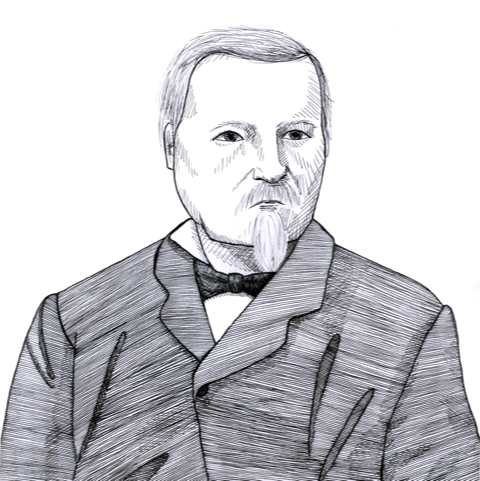Liberty Matters
Inflationary Rationalism
 Matt argues that anarchist thought counts as constructivist rationalism, even if it advocates giving free rein to spontaneous order, so long as the arguments for doing so are based on individual reason. For Matt, constructivist rationalism is a way of thinking, regardless of the content of what is thought. And he identifies Spencer’s case for the law of equal freedom, and Molinari's insistence on absolute economic principles, as instances of such rationalism.
Matt argues that anarchist thought counts as constructivist rationalism, even if it advocates giving free rein to spontaneous order, so long as the arguments for doing so are based on individual reason. For Matt, constructivist rationalism is a way of thinking, regardless of the content of what is thought. And he identifies Spencer’s case for the law of equal freedom, and Molinari's insistence on absolute economic principles, as instances of such rationalism.I think this attempt to make constructivist rationalism broader than a commitment to top-down rational planning of social institutions makes it so broad as to lose its edge as a tool of criticism. In particular, it makes it so broad that Hayek himself will count as a constructivist rationalist.
What, after all, is Spencer’s argument for the law of equal freedom (e.g., in Social Statics? It is that, given the variation in human abilities and preferences, there is no way for us to know enough to construct detailed universal advice as to how to act, and so we should instead just give maximum scope to each person to pursue happiness in her own way. If that makes Spencer a constructivist rationalist, what is Hayek?
As for Molinari’s absolute economic principles, Hayek himself argues that economic principles are knowable a priori and so do not require empirical testing.[1] Once again, Matt’s broadened definition of constructivist rationalism is so broad as to include Hayek. (Indeed, as far as I can see, it’s so broad as to condemn mathematics and geometry -- if content really is irrelevant as Matt claims.)
On a related point: as Charles Johnson has noted,[2] the term “spontaneous order” is used, by Hayek and others, in three different ways: a) consensual as opposed to coercive, b) polycentric/participatory as opposed to directive, and c) emergent as opposed to consciously designed. It's a mistake, I think, to assume that these always go together, or are equally desirable in all contexts. In particular, I don’t think one is succumbing to constructivist rationalism if one sees the achievement of a free society as involving the building of a deliberate, coordinated social movement to inculcate certain values (in a manner neither directive nor coercive). To employ once more my “Hayek quoque”: What else was Hayek doing in trying to “make the building of a free society once more an intellectual adventure, a deed of courage”?[3] Hayek had enough confidence in individual human reason to publish over twenty books, to found the Mont Pelerin Society, and so forth. He didn't sit back and wait for the market, or evolution, or tradition to take care of it. As Johnson likes to say: “We are market forces.”[4]
In a more recent comment, Matt also wonders why, if market anarchism is so great, real-life stateless legal orders are tribal and kinship-based rather than market-based. The simple answer is: They’re not, or at least they aren’t always. The suretyships of pre-Norman England were voluntary associations, not kinship-based.[5] Chieftains in medieval Iceland competed for clients, who could switch allegiance from one chieftain to another without regard either to kinship or to geography.[6] The private security associations of the American frontier we not kinship-based either.[7]
In any case, Matt’s challenge to market anarchism can also be raised to minarchism: If minarchy is so great, why don’t we see any states that are minarchies?
Endnotes
[1] F. A. Hayek, “The Facts of the Social Sciences,” in Individualism and Economic Order (Chicago: University of Chicago Press, 1948), ch. 3; online: <https://mises.org/books/individualismandeconomicorder.pdf>.
[2] Charles W. Johnson, “Women and the Invisible Fist: How Violence Against Women Enforces the Unwritten Law of Patriarchy”; online: <http://charleswjohnson.name/essays/women-and-the-invisible-fist/women-and-the-invisible-fist-2013-0503-max.pdf>.
[3] F. A. Hayek, “The Intellectuals and Socialism,” The University of Chicago Law Review (Spring 1949); online: <https://library.mises.org/books/friedrich%20a%20hayek/Intellectuals%20and%20Socialism.pdf>.
[4] Charles W. Johnson, “In a Freed Market, Who Will Stop Markets From Running Wild and Doing Crazy Things?”; online: <http://radgeek.com/gt/2009/06/12/freed-market-regulation>.
[5] Albert Loan, “Institutional Bases of the Spontaneous Order: Surety and Assurance,” Humane Studies Review 7.1 (Winter 1991-92); online: <http://mason.gmu.edu/~ihs/w91essay.html>.
[6] Jesse L. Byock, Viking Age Iceland (New York: Penguin, 2001).
[7] Terry L. Anderson and Peter J. Hill, The Not So Wild, Wild West: Property Rights on the Frontier (Stanford, Cal.: Stanford, 2004).
Copyright and Fair Use Statement
“Liberty Matters” is the copyright of Liberty Fund, Inc. This material is put on line to further the educational goals of Liberty Fund, Inc. These essays and responses may be quoted and otherwise used under “fair use” provisions for educational and academic purposes. To reprint these essays in course booklets requires the prior permission of Liberty Fund, Inc. Please contact oll@libertyfund.org if you have any questions.